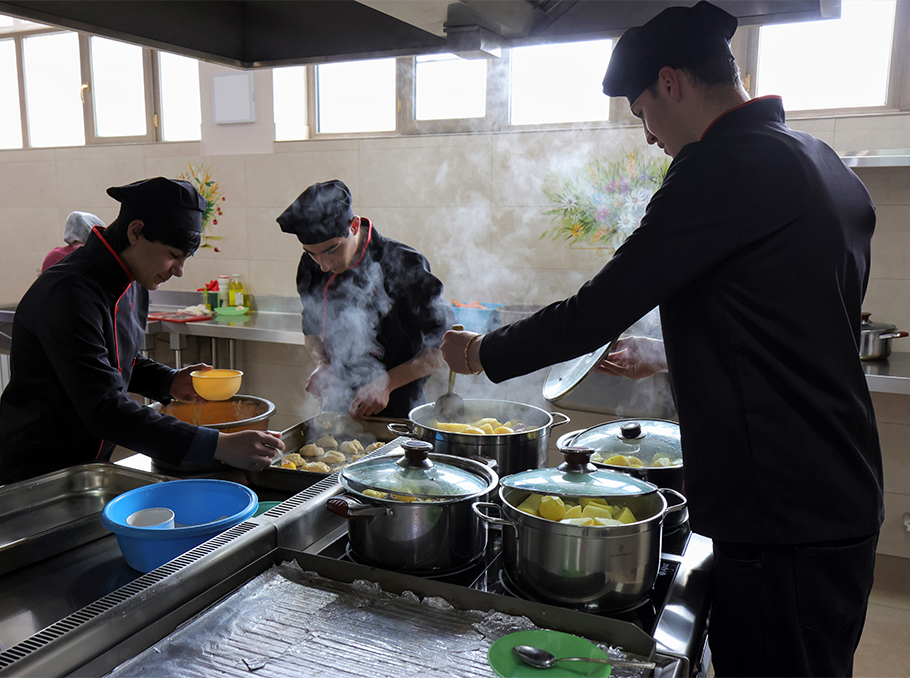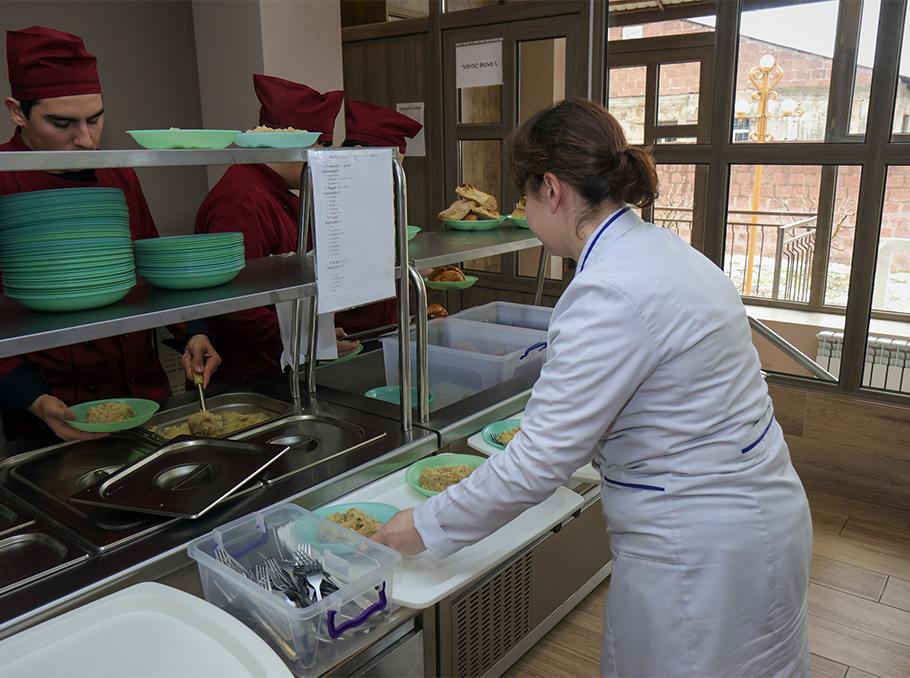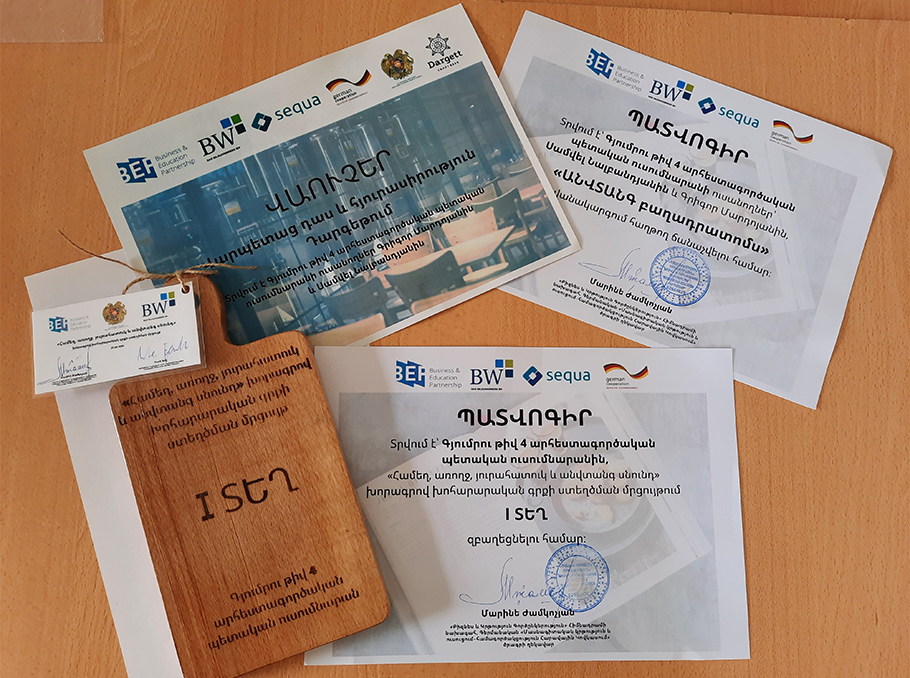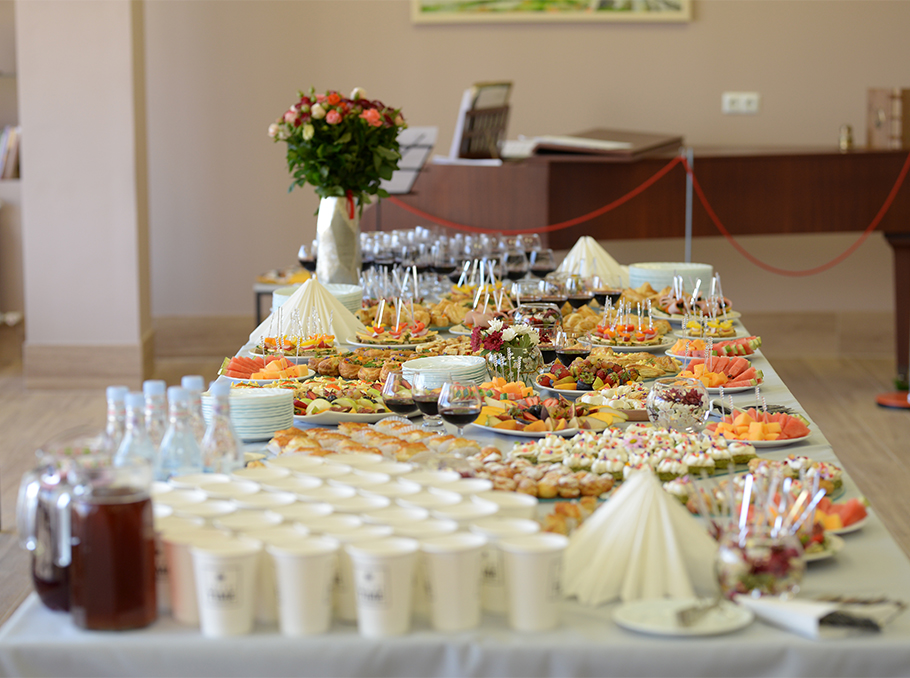“Cook for others, learn for yourself.”
This is the principle Edgar Hovsepyan, 17, from Gyumri, is guided by. In a family of three brothers he is the right hand of his mother. He helps in the kitchen and prepares various dishes. At home Edgar prepared their favourite fried potatoes: he does it in different ways, colours and flavours. He is a real master of various types of cakes and dishes.
Edgar did not think much when choosing a profession. He decided to turn his favourite occupation into his profession and delve deeper into it from the age of 15.
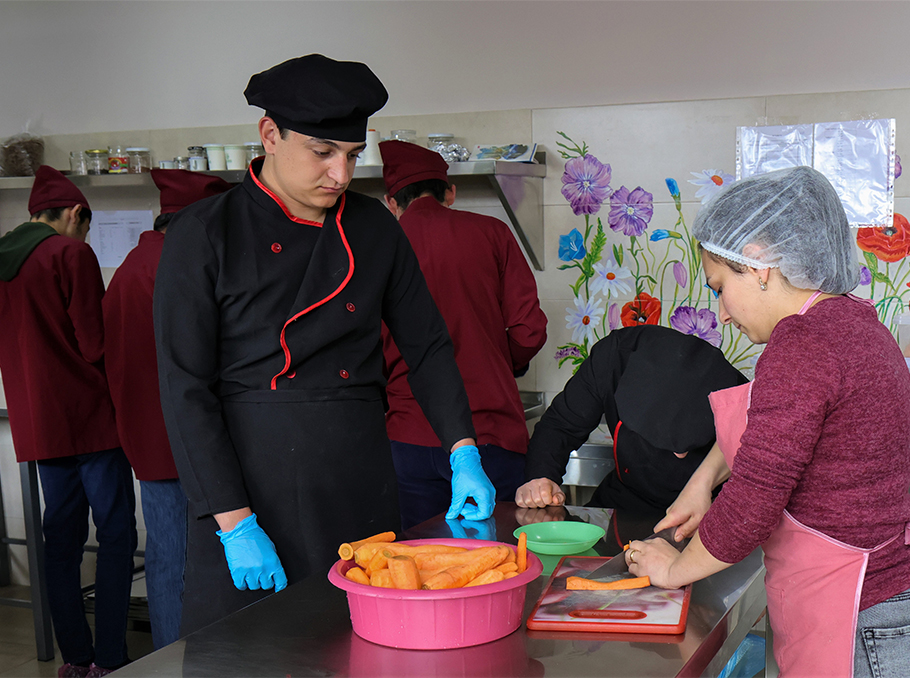 Edgar Hovsepyan
Edgar Hovsepyan Photo: Mediamax
“I found out that you can learn cooking at Gyumri college N4. I told my mother about it and after finishing the 9th grade we came here. I have no regrets, especially since the education here is different: we are both learning and gaining work experience,” says Edgar and describes the learning process in detail.
They acquire theoretical knowledge at school, and practical knowledge at restaurants and cafes in Gyumri. They manage to work and learn at the same time, spending 1-3 days a week getting practical knowledge.
“While working, we develop other abilities as well, like to orient right, to deliver on time, to communicate, to be careful, and all this is a great advantage. At first it was very difficult to imagine learning outside the college, but we gradually got used to it,” says Edgar.
Differences and advantages of dual education
The dual education model was piloted in Gyumri Craftsman State School N 4 in 2018. At the request of the college and with the permission of the Ministry of Education, Science, Culture and Sports as a specialisation cooking is being taught there in accordance with this education model, that is, the students study in two environments. Qnarik Aharonyan, the school principal, assures that this complementary training plays a great role in the training of future professional chefs.
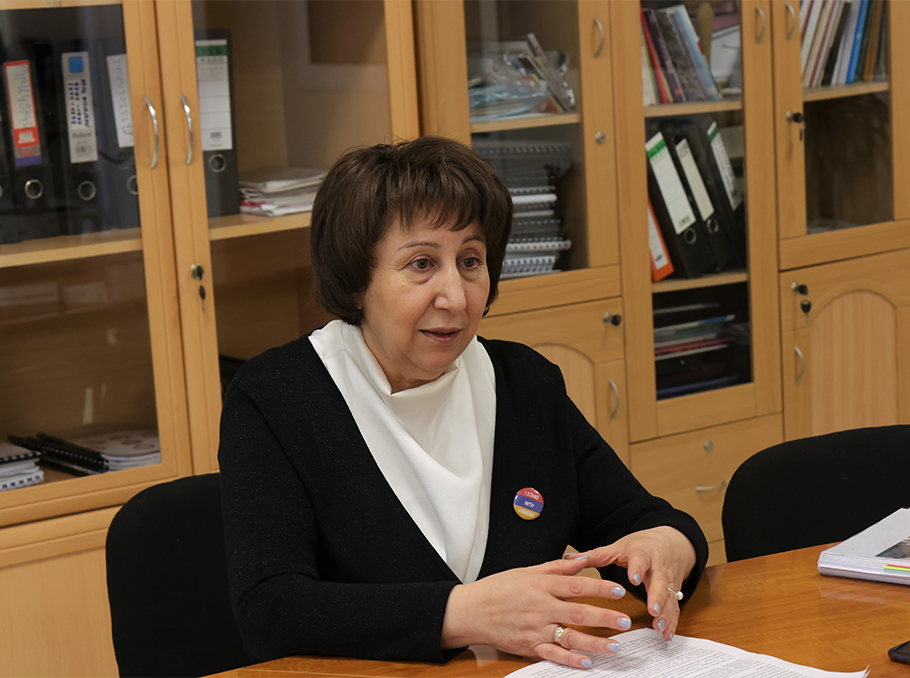 Qnarik Aharonyan
Qnarik Aharonyan Photo: Mediamax
“The 3 years of study of culinary profession remain unchanged. Previously, with the state curriculum, we were guided by the standards and curriculum approved by the Ministry, while in the case of the dual system, we have developed the standards with the employers. We have included all their requirements and suggestions to prepare appropriate specialists for the labour market and help employers find qualified staff easily. With the dual education model employers have an advantage of getting to know the student’s abilities and improve them. It was very difficult in the beginning. We started working with only 33 employers. We feared how the 14-15 years old students will study and work in their kitchen. We barely convinced the employers to take at least one student, but later they realised that this is the best way to train a skilled specialist,” says Qnarik Aharonyan.
She also emphasised the importance of working with parents as they are the ones who should help their children to orient in their profession.
“The lecturer, the employer and the parent fill in the record books we keep during the studies. These three circles should work interrelated and help the child in work and study.
The dual education system is also effective for the educational institution. In this way we manage to strengthen cooperation with the private sector. So, all parties benefit.”
In the case of a dual education model, the student also becomes more self-confident, which helps him or her a lot during various international competitions.
I got several job offers from restaurants thanks to the college
Arsen Mkhitaryan studied and graduated from Gyumri Craftsman State School N 4. He worked at several restaurants and believes that cooking is a quite difficult profession and not every person can master it. Often, the student is limited to only theoretical knowledge, having no opportunity to fill the practical gap which makes it impossible to enter the labour market. But the combination of theoretical and practical knowledge makes it possible to overcome many obstacles.
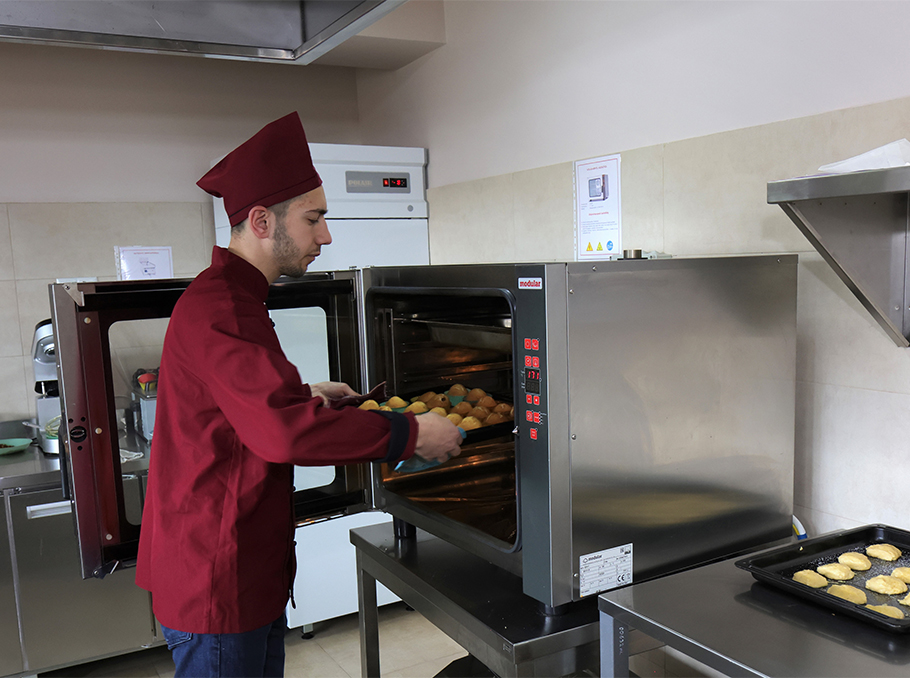 Arsen Mkhitaryan
Arsen Mkhitaryan Photo: Mediamax
“I worked for different employers and in the kitchen of our school. In 2021 with the support of GIZ, we received kitchen equipment, tools and property, which made our practical training more effective. Under “Free Food” programme we also prepared different soups, salads, pilaffs, desserts for the students of our educational establishment,” says Arsen and shows pictures of his favourite dishes.
School N 4 gave students the opportunity to choose several restaurants, learn the requirements of different employers, learn the rules and orders of different cuisines, and find their place in this field more easily.
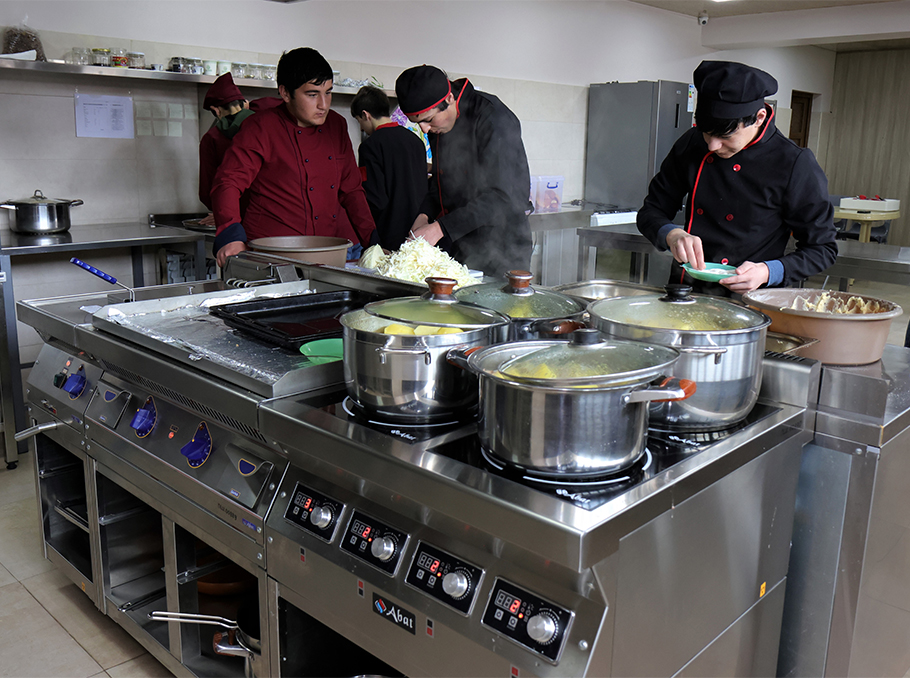
Photo: Mediamax
“I received several job offers from restaurants thanks to the college. Some of my fellow students got a job offer from the same restaurants and cafes where they worked while studying. I consider this very important, it means that the dual system has succeeded,” says Arsen and rushes to remove the cake from the oven.
To cook means to create
Master Ani Petoyan introduces children to cooking and teaches to create. The designer by primary profession, she has been so carried away by the colours and flavours of the culinary world that considers every new dish to be the birth of a new creation.
“Cooking is a very beautiful and hard profession, it includes all sciences: history, geography, chemistry, art, colour, music, taste, smell. Those cooks who master all this are successful, because the dish is not only taste and aroma, it is also a character, a temperament, a part of the culture of the given country. I do everything so that our students not only cook, but also create and learn all these nuances. At the same time, I must mention that few employers in Gyumri are open for culinary creations and have the courage, but luckily the approach is gradually changing. Our students take something new with them, and some employers accept these suggestions and include them in the menu.
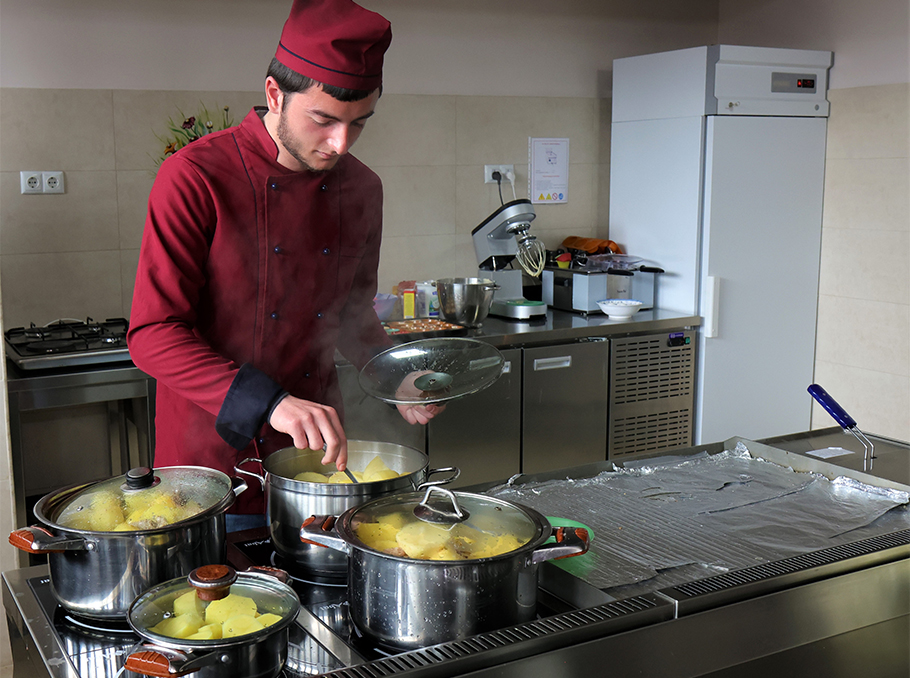
Photo: Mediamax
“Food Time” food chain is periodically looking for chefs and was one of the first to start cooperating with Gyumri Craftsman State School N 4. They appreciate that students with a knowledge base come to them, and the journey of becoming a good chef becomes shorter.
“From the very beginning, the students are under the supervision of our chef. We also warn them and their parents about the problems they may face and what pay attention to. We also often offer to work with us apart from the education process, of course, with the permission of the parents, because they are still minors. Now 12 students are doing internships in our network, we also have graduates of previous years who are already working,” says Armine Manukyan, manager of “Food Time”.
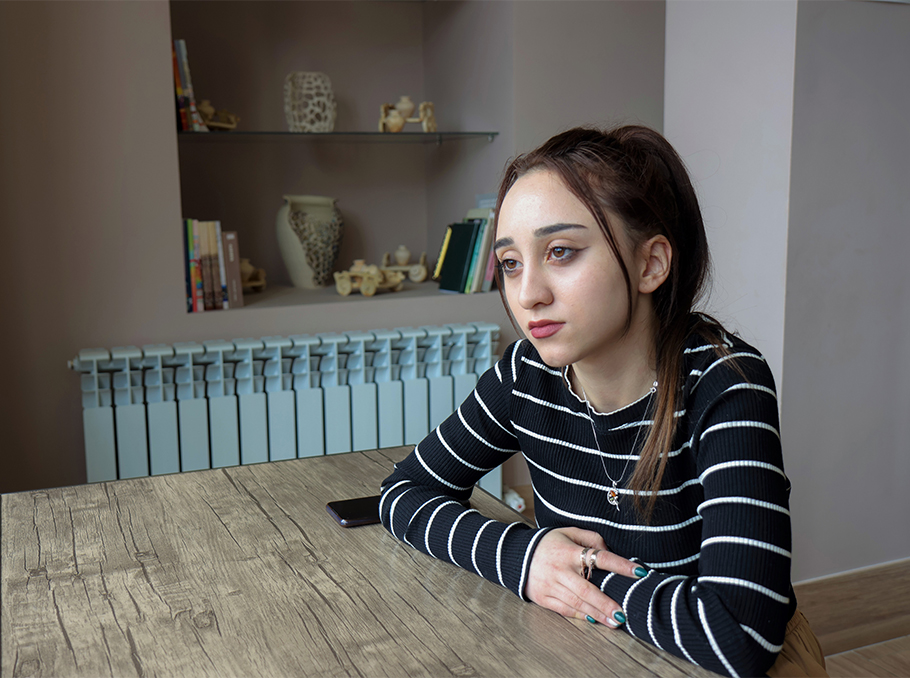 Armine Manukyan Food time meneger
Armine Manukyan Food time menegerPhoto: Mediamax
This system provides many advantages to employers, but there is a problem both for them and educational institutions: students may accidentally damage equipment at work and in this case the insurance does not cover the cost of its repair. However, steps are being taken to solve the issue.
The implementation of the dual education model in the Republic of Armenia is supported by the “Private Sector Development and Technical Vocational Education and Training in the South Caucasus” (PSD TVET) and MAVETA programs.
*“Private Sector Development and Technical Vocational Education and Training in the South Caucasus” (PSD TVET) program is implemented by the Deutsche Gesellschaft für Internationale Zusammenarbeit (GIZ) GmbH on behalf of the Federal Ministry for Economic Cooperation and Development (BMZ).
MAVETA program started on December 3, 2021, with a preparatory phase that has been successfully summarized in August 2022. The 1st main phase of implementation started afterwards, which will last until August 2025 with total budget of CHF 8.3 million. MAVETA program works to anchor this dual education approach at the political and institutional level. Within the framework of the program, dual education has been introduced at Goris State Agricultural College, Sisian College of ANAU (Syunik), Stepanavan State Agricultural College (Lori), Berd State Multifunctional College (Tavush), Echmiadzin Craftsman State School (Armavir) and Yerevan College of ANAU.
The MAVETA project is funded by a broad coalition of international and local organizations led by the Swiss Agency for Development and Cooperation (SDC), including the Austrian Development Agency, the German Ministry for Economic Cooperation and Development (BMZ), the Government of Armenia, the Swiss Church Aid (HEKS/EPER) NGO, Izmirlian Foundation, the Strategic Development Agency (SDA) NGO and Vanand Agro CJSC.
The project’s implementing partners are the GIZ and HEKS/EPER with the involvement of SDA and the School of Agricultural, Forest and Food Sciences at the Bern University of Applied Sciences (HAFL).
Anahit Harutyunyan (Gyumri)
Photos by Gevorg Ghazaryan









